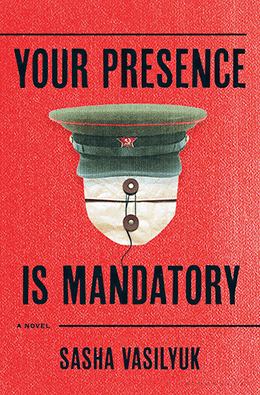Reviewed by NEAL GENDLER
Going through husband Yefim Shulman’s things after his death in Donetsk, Ukraine, his wife Nina gets the biggest shock of their 50-plus years of marriage.
In the briefcase under his bed, she finds a letter to the KGB that upends a central part of what she and his family knew as the life story of a wartime soldier who became a geologist.
“He had had a way with everyone, including the authorities,” his family recalls after his burial. But his good nature vanished if asked about his war service; he would not discuss it.
Yefim’s secret doesn’t last very far into Sasha Vasilyuk’s engrossing novel, Your Presence Is Mandatory. With deep understanding and great economy, Vasilyuk fascinatingly describes the lives and choices of Yefim and his family and of Ukraine and its Jews, deftly jumping among decades.
Readers needn’t know the history of Ukraine under Communism to be captivated, but those who do will appreciate it even more.
Mentioned repeatedly is the early 1930s struggle to avoid starvation, when Stalin’s food-confiscation program killed an estimated 3.5 to 5 million Ukrainians. (For a definitive account, see historian Anne Applebaum’s monumental 2017 book Red Famine.)
In June 1941, Yefim and his pal Ivan Didenko are young artillerymen stationed in Soviet-ruled Lithuania. Attacked on the first day of the war and outnumbered on the second, surviving soldiers are ordered to retreat. As they do, a German shell flings Yefim into the air and cuts off the end bones of his right thumb and index finger.
Soon, they are captured, a death sentence for a Jew. At the prison camp, Yefim borrows the last name of his dead commander, Lt. Komarov. Ivan substitutes himself for Yefim at naked physical examinations.
We follow them through a compelling story of prison brutality and forced factory and farm labor.
Fellow prisoners dampen Yefim’s patriotic enthusiasm for Stalin and Communism. One, Nikonov, asks him: “What do you think is the purpose of the Red Army soldier?”
Yefim replies: “to defend the Motherland.”
Nikonov says that with all Yefim has seen, he should know better.
“A Red Army soldier has only two purposes,” Nikonov says. “Shoot bullets into the enemy chests or absorb bullets so they run out of them quicker.” He says he’s “seen how the Party thinks.”
Near war’s end, Yefim is freed by the Soviet army and rudely interrogated by a counterspy official who hears his story. He says Yefim must serve another 18 months. He’s sent into combat to attack Berlin, then spends the rest of the time at a freezing Baltic outpost.
Returning to his Ukrainian village in October 1946, he finds his mother and learns that his father, four brothers, and sister are dead. Before discharge, he must report to an official in charge of records. He tells his story and says he’s his mother’s sole remaining child.
Surprisingly, the heavyset official in his 50s turns friendly, says he’ll enter all the army years as active duty, tells him to conceal having been a prisoner, “and if anyone asks, your medals were stolen on the train.”
Postwar, Yefim enrolls in college where he meets Nina, who studies corals. They marry, have a son and daughter and leave lovely Kiev for grimy, industrial Donetsk, where she has a faculty position and a growing reputation as a paleontologist.
Yefim lets his family assume that he fought from war’s start to Berlin.
He has two reasons: One is what Vasilyuk describes as public contempt for former Soviet prisoners of war; one interrogator accuses him of having “sat out the war.” The other likely was fear that his forced work for the Germans would label him a collaborator and, like tens of thousands, he’d become a prisoner in the Gulag.
But in 1984, he receives a summons from the KGB, the Russian Committee for State Security, that says, “your presence is mandatory.” An inconsistency has been found in his wartime records.
“Almost 40 years he’d waited for this day,” Vasilyuk writes. “He had consistently falsified every employment and residency form, stayed clear of veterans’ organizations, kept his tongue whenever anyone mentioned the war, and tried not to feel guilty for misleading his family.
“He’d almost convinced himself that his big lie wouldn’t come back to haunt him. Yet here it was. He felt terrified, ashamed — and this was the part that surprised him — relieved.” At age 62, “the day of reckoning had finally come.”
He’d expected to get caught much sooner.
Vasilyuk’s story is too good for me to reveal any more. And don’t miss the author’s note at the end. No peeking.
***
Neal Gendler is a Minneapolis writer and editor.
(American Jewish World, July 2025)




















